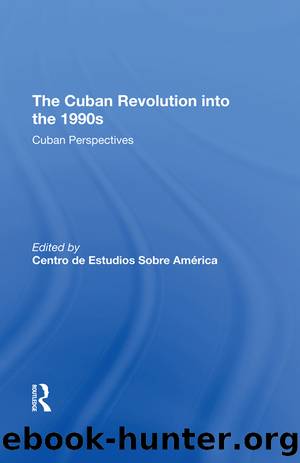Artificial Intelligence With Python: Your Complete Guide to Building Intelligent Apps Using Python 3.x, 2nd Edition by Alberto Artasanchez & Prateek Joshi

Author:Alberto Artasanchez & Prateek Joshi [Artasanchez, Alberto & Joshi, Prateek]
Language: eng
Format: epub
Tags: Computers, Artificial Intelligence, General, Natural Language Processing, Languages, Python
ISBN: 9781839216077
Google: P0fODwAAQBAJ
Goodreads: 51111288
Publisher: Packt Publishing Ltd
Published: 2020-01-31T07:57:40+00:00
Methods Borrowed from Capitalism
Because of the way it functions, the economic accounting system is inseparably linked to the dull instruments left to us by capitalism. It cannot work without capitalist economic mechanisms and categories borrowed from the capitalist market system, and it assimilates these mechanisms and categories not as limitations but as virtues. Using these categories and the economic and social structures and relations they describe in capitalist society makes it difficult, however, to deal with a reality whose characteristics are not theoretically understood. The law of value is an element of Marxist economic theory that has been torn out of its context as the fundamental law of motion of capitalism and converted into a fundamental pillar of more than one theory on the political economy of the transition to socialism. Cheâs critical analysis of such use of the law of value is one of his greatest contributions to Marxist-Leninist theory.
His position can be summed up as follows: Rejecting the law of value as the guiding principle in the transition to communism, he distinguished between acknowledging the existence of a series of capitalist relations that necessarily persist during the transition (including the law of value, given its character as an economic lawâthat is, as an expression of certain economic tendencies) and suggesting the possibility of managing the economy by the conscious and fundamental use of the law of value and its corollaries. He denied that the transition to communismâeven in its first phasesâhad to unfold in accordance with the law of value and the other categories of commodity production implied by its use and that the monetary-commodity relations that reached their highest development under capitalism had to be developed in the transition period as a vehicle for achieving communist society. He rejected the idea that it was impossible to avoid using âthe commodity category in relations among state enterprises,â considering âall such establishments to be part of the single large enterprise that is the stateâ (Guevara, 1987:220). He held it necessary to implement economic policies that would lead to the gradual withering away of the old relations, including the market, money (so long as its functions were distorted), and thus the lever of direct material self-interest, or, better, would lead to the elimination of the conditions that gave rise to these relations:
We understand that capitalist categories are retained for a time and that the length of this time cannot be determined beforehand. But the characteristics of the transition period are those of a society throwing off its old bonds in order to arrive quickly at the new stage.
The tendency must be, in our opinion, to eliminate as vigorously as possible the old categories, including the market, money, and, therefore, the lever of material interestâor, to put it better, to eliminate the conditions for their existence. (Guevara, 1987:219)
Download
This site does not store any files on its server. We only index and link to content provided by other sites. Please contact the content providers to delete copyright contents if any and email us, we'll remove relevant links or contents immediately.
| Computer Vision & Pattern Recognition | Expert Systems |
| Intelligence & Semantics | Machine Theory |
| Natural Language Processing | Neural Networks |
Algorithms of the Intelligent Web by Haralambos Marmanis;Dmitry Babenko(16508)
Jquery UI in Action : Master the concepts Of Jquery UI: A Step By Step Approach by ANMOL GOYAL(9519)
Test-Driven Development with Java by Alan Mellor(7741)
Data Augmentation with Python by Duc Haba(7616)
Principles of Data Fabric by Sonia Mezzetta(7383)
Learn Blender Simulations the Right Way by Stephen Pearson(7296)
Microservices with Spring Boot 3 and Spring Cloud by Magnus Larsson(7144)
Hadoop in Practice by Alex Holmes(6609)
RPA Solution Architect's Handbook by Sachin Sahgal(6521)
The Infinite Retina by Robert Scoble Irena Cronin(6222)
Big Data Analysis with Python by Ivan Marin(5947)
Life 3.0: Being Human in the Age of Artificial Intelligence by Tegmark Max(5520)
Pretrain Vision and Large Language Models in Python by Emily Webber(4900)
Infrastructure as Code for Beginners by Russ McKendrick(4660)
Functional Programming in JavaScript by Mantyla Dan(4455)
WordPress Plugin Development Cookbook by Yannick Lefebvre(4392)
The Age of Surveillance Capitalism by Shoshana Zuboff(4256)
Embracing Microservices Design by Ovais Mehboob Ahmed Khan Nabil Siddiqui and Timothy Oleson(4151)
Applied Machine Learning for Healthcare and Life Sciences Using AWS by Ujjwal Ratan(4140)
